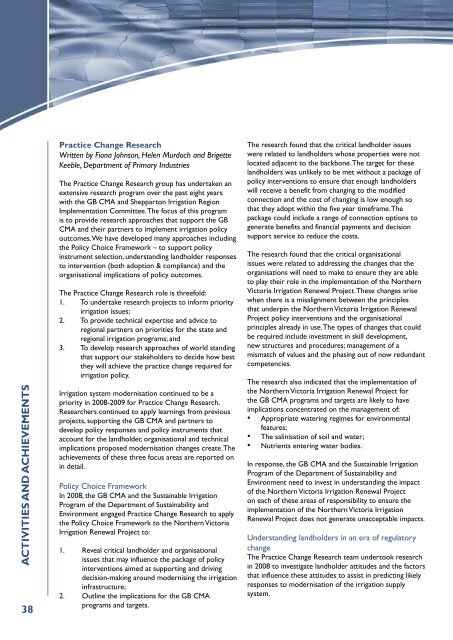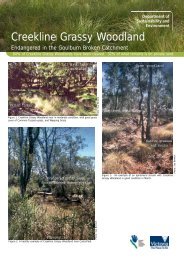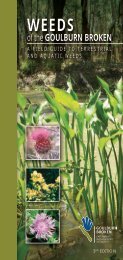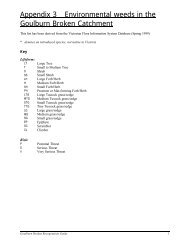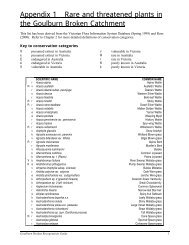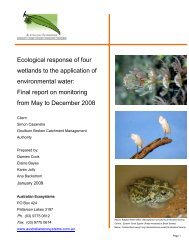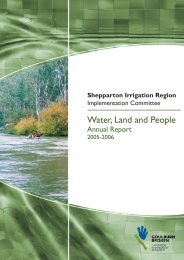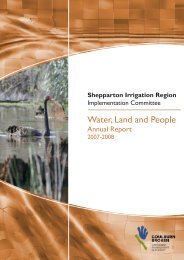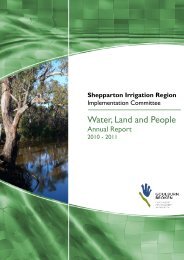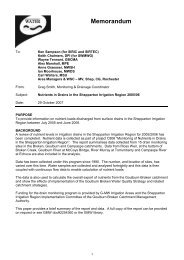Water, Land and People - Goulburn Broken Catchment ...
Water, Land and People - Goulburn Broken Catchment ...
Water, Land and People - Goulburn Broken Catchment ...
Create successful ePaper yourself
Turn your PDF publications into a flip-book with our unique Google optimized e-Paper software.
ACTIVITIES AND ACHIEVEMENTS<br />
38<br />
Practice Change Research<br />
Written by Fiona Johnson, Helen Murdoch <strong>and</strong> Brigette<br />
Keeble, Department of Primary Industries<br />
The Practice Change Research group has undertaken an<br />
extensive research program over the past eight years<br />
with the GB CMA <strong>and</strong> Shepparton Irrigation Region<br />
Implementation Committee. The focus of this program<br />
is to provide research approaches that support the GB<br />
CMA <strong>and</strong> their partners to implement irrigation policy<br />
outcomes. We have developed many approaches including<br />
the Policy Choice Framework – to support policy<br />
instrument selection, underst<strong>and</strong>ing l<strong>and</strong>holder responses<br />
to intervention (both adoption & compliance) <strong>and</strong> the<br />
organisational implications of policy outcomes.<br />
The Practice Change Research role is threefold:<br />
1. To undertake research projects to inform priority<br />
irrigation issues;<br />
2. To provide technical expertise <strong>and</strong> advice to<br />
regional partners on priorities for the state <strong>and</strong><br />
regional irrigation programs; <strong>and</strong><br />
3. To develop research approaches of world st<strong>and</strong>ing<br />
that support our stakeholders to decide how best<br />
they will achieve the practice change required for<br />
irrigation policy.<br />
Irrigation system modernisation continued to be a<br />
priority in 2008-2009 for Practice Change Research.<br />
Researchers continued to apply learnings from previous<br />
projects, supporting the GB CMA <strong>and</strong> partners to<br />
develop policy responses <strong>and</strong> policy instruments that<br />
account for the l<strong>and</strong>holder, organisational <strong>and</strong> technical<br />
implications proposed modernisation changes create. The<br />
achievements of these three focus areas are reported on<br />
in detail.<br />
Policy Choice Framework<br />
In 2008, the GB CMA <strong>and</strong> the Sustainable Irrigation<br />
Program of the Department of Sustainability <strong>and</strong><br />
Environment engaged Practice Change Research to apply<br />
the Policy Choice Framework to the Northern Victoria<br />
Irrigation Renewal Project to:<br />
1. Reveal critical l<strong>and</strong>holder <strong>and</strong> organisational<br />
issues that may influence the package of policy<br />
interventions aimed at supporting <strong>and</strong> driving<br />
decision-making around modernising the irrigation<br />
infrastructure;<br />
2. Outline the implications for the GB CMA<br />
programs <strong>and</strong> targets.<br />
The research found that the critical l<strong>and</strong>holder issues<br />
were related to l<strong>and</strong>holders whose properties were not<br />
located adjacent to the backbone. The target for these<br />
l<strong>and</strong>holders was unlikely to be met without a package of<br />
policy interventions to ensure that enough l<strong>and</strong>holders<br />
will receive a benefit from changing to the modified<br />
connection <strong>and</strong> the cost of changing is low enough so<br />
that they adopt within the five year timeframe. The<br />
package could include a range of connection options to<br />
generate benefits <strong>and</strong> financial payments <strong>and</strong> decision<br />
support service to reduce the costs.<br />
The research found that the critical organisational<br />
issues were related to addressing the changes that the<br />
organisations will need to make to ensure they are able<br />
to play their role in the implementation of the Northern<br />
Victoria Irrigation Renewal Project. These changes arise<br />
when there is a misalignment between the principles<br />
that underpin the Northern Victoria Irrigation Renewal<br />
Project policy interventions <strong>and</strong> the organisational<br />
principles already in use. The types of changes that could<br />
be required include investment in skill development,<br />
new structures <strong>and</strong> procedures; management of a<br />
mismatch of values <strong>and</strong> the phasing out of now redundant<br />
competencies.<br />
The research also indicated that the implementation of<br />
the Northern Victoria Irrigation Renewal Project for<br />
the GB CMA programs <strong>and</strong> targets are likely to have<br />
implications concentrated on the management of:<br />
• Appropriate watering regimes for environmental<br />
features;<br />
• The salinisation of soil <strong>and</strong> water;<br />
• Nutrients entering water bodies.<br />
In response, the GB CMA <strong>and</strong> the Sustainable Irrigation<br />
Program of the Department of Sustainability <strong>and</strong><br />
Environment need to invest in underst<strong>and</strong>ing the impact<br />
of the Northern Victoria Irrigation Renewal Project<br />
on each of these areas of responsibility to ensure the<br />
implementation of the Northern Victoria Irrigation<br />
Renewal Project does not generate unacceptable impacts.<br />
Underst<strong>and</strong>ing l<strong>and</strong>holders in an era of regulatory<br />
change<br />
The Practice Change Research team undertook research<br />
in 2008 to investigate l<strong>and</strong>holder attitudes <strong>and</strong> the factors<br />
that influence these attitudes to assist in predicting likely<br />
responses to modernisation of the irrigation supply<br />
system.


